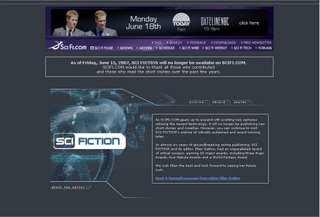A sharply barbed, but cheerfully cheeky
article written by Andrew Orlowski in The Register contains details about CNET.com's recently announced "partial" acquisition of the assets of
MP3.com - the world's largest repository of "legal" MP3 music files.
According to the article, CNET.com's acquisition only extends to certain "specific assets" relating to MP3.com's domain name and back end file-serving technology, not the site's massive file MP3 music file archive, which will be destroyed sometime after December 2, 2003.
Orlowski writes:
Not since the Great Leap Forward has there been such a destruction of the commons. Back then, for political reasons, millions of books were burned. Now, for very sensible commercial reasons that we must not question, millions of MP3s will be lost to the commons. You have precisely seventeen days to grab the good stuff.Some might find it a bit disingenuous to compare the millions of MP3 files on MP3.com - many of which even the most open-minded music reviewers would agree are of marginal quality - with the fine old books destroyed by the Communists and the Nazis back in the bad old 20th Century. But Orlowski is making an important point here: the destruction of the multi-gigabyte MP3.com libraries will create a gigantic hole that will be impossible to be patched by future cultural historians - a "data holocaust" whose future effects cannot possibly be known right now.
One might even go so far as to question whether the music on MP3.com - at least some of it - isn't superior, or at least more originally innovative than the vast majority of music playing on America's tightly playlisted FM radio stations, which are controlled by a handful of conglomerated, juvenocratic taste arbiters that have "dumbed down" society's collective pop culture to the sub-nadir point.
Of course, it's true that many or most of the files now residing on MP3.com's servers will continue to exist on the hard drives and CD disks of the many thousands of artists who chose to upload their creative works to a central repository. So what's the fuss about? Unless
all copies of a digital work are wiped out, how is digital culture diminished?
Well, it's not just the information that's important, but the
information about the information (Note: pipe-smoking, chin-stroking, lotus-eating info-theorists from Northern California call this stuff "meta-information"). In the case of the MP3.com file archives, this meta-information is frequently more interesting than the files themselves. How many times was a given satirical tune about, say, Bush or Blair downloaded? Which appeared on whose streaming radio playlists? Did, say the "grunge" genre grow or wane from 1998 to 2000? What did the digital musical underground think of the 9/11/01 attacks and how did they respond? What was the ratio of pro-war to anti-war songs uploaded in, say, the Spring of 2003? The list of possible "meta-information-related queries" that might be posed in the future goes on and on.
In its heyday, MP3.com also provided artists who agreed to freely share their musical works home page-building tools, resulting in many thousands of home pages being built from 1998 onward. What will happen to all of these
fascinatingly obscure pages, which MP3.com's users spent hundreds of thousand of unpaid person-hours creating?
In the flick of a switch on December 3rd, 2003, all of this will be lost - forever. Funny, isn't it, that we live in a time where you can go to jail for copying a single MP3 file, but not a single law prohibts a company from destroying millions of them!
Defenders of the impending destruction will surely mention that neither MP3.com nor CNET had any necessary contractual obligation to preserve works uploaded to its service, and that is certainly true in the purely legal sense. In a moral sense, however, the callous disregard for the worldwide collaberative effort that built MP3.com ranks among the most sordid acts yet seen in the history of the Web. Without the critical mass of content uploaded by musicians to the service, MP3.com would never have become enough of a force on the Web to gain investment money from Vivendi/Universal, and now, to seal a lucrative deal with CNET. These musicians were used by MP3.com's executives to get rich, and now everything they built is being junked. My guess is that had any single artist known the fate eventually awaiting their virtual projects, they would have chosen another service, or built there own sites, but now, all that awaits them are hundreds, perhaps thousands, of broken incoming links.
History is a fragile thing in an age of bits. Any "guarantees of persistence" that history used to enjoy becuase its vehicle was a physical medium no longer exist. Once destroyed, it is gone forever. By presuming that people of the future will regard our electronic cultural products such as the MP3.com archive in exactly the same way that we do now - in terms of their commodity value - we take an enormous, arrogant risk.
By shunning any and all obligation to the future, as well as to the artists across the world who invested millions of hours of creative effort in creating a shared cultural resource, we commit a new category of crime: call it "A Crime Against History". Those of us who spend time worrying about digital history - and the larger question of whether digital information has any history at all in store for it - will find a disturbing precedent here. Other common resources that we take for granted (even the Web itself) may soon be balkanized, broken up, or deleted for purely economic reasons. Other "trusted" institutions (and MP3.com was certainly trusted by the people who uploaded files to it) may turn wicked in a moment's time.
Perhaps history, to paraphrase Clauswitz, is now "too important to be left to the historians". It is certainly too important to be left to the wiles of callous businessmen who, for a few pounds of silver, will so easily betray the trust of thousands of digital musicians and listeners across the world.
Labels: CNet, Data Holocaust, MP3.com




